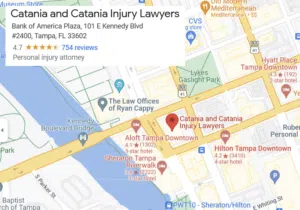
If you’re injured in an accident caused by someone else, you could be eligible to seek compensation in a personal injury lawsuit. A statute of limitations is a part of the law that sets a deadline for when a person must initiate legal proceedings. Statutes of limitations vary from state to state and vary based on the nature of the dispute or case.
In a personal injury case, the deadline is usually a certain amount of time from the date of injury, such as from the date of a car accident. Deadlines may differ depending on the circumstances of any given accident or illness.
Regardless of the statute of limitations, it is always important to consult a qualified Florida personal injury lawyer as soon as possible after you are injured. Missing a critical deadline could mean missing out on the opportunity to compensation owed to you by a negligent party.
Table of Contents
What Is the Statute of Limitations for a Personal Injury Case in Florida?
Under Florida law, the statute of limitations for your case may vary depending on whether your case involves injuries or a fatality, whether you sustained injuries as a result of a medical procedure, whether the victim is a minor, and any number of other factors.
Most cases involving injuries caused by negligence are subject to a two-year statute of limitations. In order to preserve your right to seek compensation for medical bills, lost wages, and pain and suffering, you must file your lawsuit within two years of your injury or accident.
This covers all types of accidents, such as:
- Car accidents
- Truck accidents
- Motorcycle accidents
- Bus accidents
- Pedestrian accidents
- Airplane accidents
- Construction accidents
- Slip and fall accidents
- Defective products
- Bicycle accidents
- Rideshare accidents (like Uber and Lyft)
- Boating accidents
- Other accidents caused by negligence
This is by no means an exhaustive list. Sadly, there are so many types of accidents it is impossible to list every scenario.
There are a few common circumstances that could have factors that alter important deadlines in your case, such as:
Auto Accidents
The Florida statute of limitations for motor vehicle accident injuries is typically two years. However, if the driver is uninsured, the statute of limitations is five years.
Workplace Accidents
If you’re injured in a workplace accident, you might be seeking workers’ compensation benefits. In that case, you must report your accident to your employer within 30 days of your accident. Workers’ comp has its own rules that you must follow.
However, many accidents on the job are caused by the negligence of a third party (someone other than your employer). In that case, you would have two years to file a lawsuit, just like any other injury case.
Florida Medical Malpractice Statute of Limitations
In Florida, a medical malpractice lawsuit only has a two year statute of limitations. This means that as the victim, you only have two years from the date of the medical malpractice injuries to file your claim.
However, there is something known as a statute of repose that extends the period you may file a lawsuit under certain circumstances. An extension of two years may apply if the injury goes undetected for a period of time. However, the case must be filed within four years of the procedure that caused the injury.
Additionally, there are two possible exceptions in the case of medical malpractice deadlines:
- If fraud, concealment, or misrepresentation from a healthcare provider prevents the victim from discovering the malpractice, the plaintiff will have up to seven years to file a claim. However, once the victim finds out about the malpractice, the two-year statute of limitations would still apply.
- If the case involves a child, the statute of repose can possibly be extended as well.
An attorney experienced in handling medical malpractice cases will be able to easily navigate the complexities of these types of cases.
Florida Wrongful Death Statute of Limitations
The Florida statute of limitations for wrongful death is two years. So, if the injuries sustained in an accident such as a motorcycle accident, a construction accident, or defects in a product were fatal, the wrongful death lawsuit must be filed within two years of the date of the victim’s death.
What Can Affect the Statute of Limitations?
Depending on the circumstances, the date from which you calculate the statute of limitations in Florida could vary.
Date of Injury
In Florida, the statute of limitations clock usually begins on the date of injury. In most cases, that date is the same as when the underlying accident or injury occurred.
Discovering Your Injury
In some instances, a victim might not discover their injuries until a later time, perhaps even weeks or months later. If that is the case, the statute of limitations won’t begin until either the individual discovers their injuries or should have reasonably discovered their injuries. This is often referred to as the “discovery rule.”
“Reasonably discovered” simply means what an average person would have noticed. A victim who was experiencing serious pain but refused to seek medical treatment cannot argue that they were unaware of their injuries.
This may apply in cases where there was a brain injury sustained in a crash or in asbestos cases and the injury isn’t obvious. Remember, the discovery rule may still be limited by the statute of repose places a time limit on filing, regardless of circumstances.
Tolling
In Florida, personal injury plaintiffs are permitted to toll a statute of limitations. Tolling a statute of limitations essentially pauses it from running. It’s like stopping the clock.
This may apply if situations beyond the victim’s control have prevented them from filing a lawsuit. For example, if the victim is a minor, the clock may be stopped until they reach the age of 18.
How Can A Personal Injury Lawyer Help With Your Personal Injury Case?
A personal injury attorney can help you understand the complexities of Florida statutes of limitations related to personal injury cases. Retaining an attorney early in the process is highly recommended so that you don’t miss important deadlines.
They Can Help Build a Stronger Case
Contacting a personal injury lawyer right away will give the attorney the time they need to help develop the most robust case possible before the deadline. Your attorney can ensure that the most crucial evidence is being preserved. They will speak with witnesses early, which will likewise preserve their testimony if the claim eventually goes to trial.
They Can Protect You
Your Florida personal injury attorney can also protect your rights, especially when dealing with insurance companies. Remember that the defendant’s insurance company is not looking out for your best interests, no matter what they say. In fact, victims should have no contact with a defendant, their attorney, or their insurance company without first consulting a personal injury lawyer.
Insurance companies often pressure victims to resolve a case early to limit their exposure and reduce their losses. Insurance companies are also known to drag out claims in hopes that the victim does not retain an attorney before the Florida personal injury statute of limitation runs out.
That’s why it is essential to contact a reputable personal injury lawyer as soon as possible after your injury.




